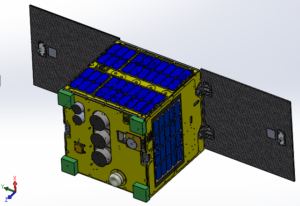
With the imminent launch of its new microsatellite, MicroDragon, Vietnam is advancing its quest to become an indigenous spacepower – with Japanese support – in an increasingly geopolitically tense neighbourhood.
Engineers from the Vietnam Space Center (VNSC) team designed the satellite while attending satellite technology courses in Japan, and with Japanese technical support. The centre has sent 36 engineers to satellite technology masters courses at five Japanese universities since September 2013. They have designed, manufactured, and tested the satellite during the courses.
MicroDragon is a 50x50x50 centimeters (19.6 inches) cube weighing about 50 kilograms (110 pounds). Once in orbit, it will monitor Vietnam’s coastal waters in the South China Sea (where Vietnam’s neighbour, China, claims territorial sovereignty) and locate fishery resources to serve Vietnam’s aquaculture sectors, collecting data to serve the country’s fishing industry.
It is scheduled to be launched by the end of this year via a Japanese Aerospace Exploration Agency (JAXA) Epsilon space launch vehicle.
The VNSC project to design the MicroDragon satellite started in 2011, under cooperation in space technology between the Vietnamese and Japanese governments.
Vietnam’s first satellite was launched into space in August 2013. The one-kilo PicoDragon operated in low Earth orbit (LEO) for three months. The country had launched four satellites previously, but they were manufactured by foreign companies.
Vietnam has plans to make the LOTUSat-2 (500 kg) synthetic aperture radar (SAR) high-resolution imaging satellite by 2022, which upon completion will put Vietnam among the leading countries in the region in terms of space technology, alongside Indonesia and Malaysia, said Pham Anh Tuan, General Director of the VNSC.





